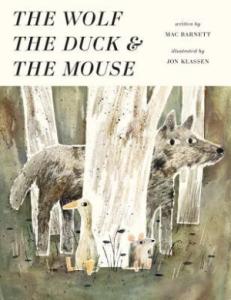What? Just... what? This-- I can't even-- Wow.

This book has gotten a lot of really awesome reviews. I haven't read them closely, in an attempt to not be influenced and to come up with my own opinion on this. I think the people who are giving it great reviews either just really like surrealism or they think there's some kind of metaphorical message in this, and if there's a message, I am not sure what it is.
This is a weird book. So, a wolf eats a mouse, but in traditional Little Red Riding Hood style, the mouse is not actually like chewed or anything like that, just swallowed whole, and the stomach is not a place where he gets digested or anything like that. Then the mouse is like, "Oh no, I'm in the wolf's stomach. This is the end of me." But, no, somebody tells him to be quiet, and he says, "Who's there?" and there's a duck in full-on clothing (despite the fact that the wolf walks around in a forest like a normal wolf) and a full-on bed with a candle that's lit in the middle of this wolf's stomach (what.) and then they have breakfasts and it's great and he got all kinds of delicious things and he's got a full-on kitchen with knives and pots and they make soup.
The mouse says, "Do you miss the outside?" The duck says, "I do not. When I was outside, I was afraid every day wolves would swallow me up. In here, that's no worry." So the mouse wants to stay, and they dance, which makes the wolf have a stomachache, so the ducks suggests to the ailing wolf that he eat some awesome food, then the duck and the mouse eat that awesome food. What? How is this wolf even surviving? It's like he has these massive tapeworms inside him, basically. Then the wolf feels miserable, and a hunter hears him feeling miserable at night and shoots at him and misses, then the wolf gets trapped. The mouse and the duck decide to fly out of the wolf's mouth with a hockey stick and colanders and pots on their heads and fly after the hunter who is scared, and "[flees] from the forest and never return[s]." The wolf is so happy that they saved his life, so he says, "Ask a favor of me." The favor they ask is apparently to be eaten again. And that's why the wolf howls at the moon: because he's got a stomach with a duck and a mouse in it that are having a party, I guess?
I think the message that people are getting from it, at least from the first half of the book, is "Don't let your misfortunes get you down." The back of the book has this quote: "'I may have been swallowed,' said the duck, 'but I have no intention of being eaten.'" But if that was the real message, then they absolutely would not want to stay in the stomach of the wolf at the end. The most accurate message I can get from the book is: "People in bad situations become so acclimated to them that it doesn't seem bad to them anymore." They actually start to like it, as in Stockholm Syndrome. I don't find that to be a good message. It might be true, but it's certainly not healthy. But it's not clear that it's the intended message, either.
It reminds me of other books by the illustrator, Jon Klassen. He's the hat guy-- the guy who really is obsessed with animals stealing the hats of other animals and getting eaten as a result. I'm never sure what to think of those, either.
I don't know. I don't know what this book is saying. It's pretty enough. Jon Klassen is a good illustrator. But I really don't understand what this book is saying. It seems like it's supposed to have a deep sort of message but for the life of me, I cannot figure out what it is. I mean, you could (if you wanted to) go really far with this metaphor. You could say that the inside of the wolf is like North Korea or something like that, where if somebody's born in North Korea they make the best of it, and if somebody gives them a chance to escape North Korea they're like, "Nope, I'd rather stay here." No no no no no. You wouldn't. Really. Think about it.
And if you keep eating all the wolf's food, the wolf is gonna die, and then you'll be stuck inside a dead wolf. And how were they able to come out of the wolf's mouth on command? If the mouse could have easily gotten out of the wolf at the beginning, wouldn't he have just done it (before he was convinced by the duck to stay)? This raises so many questions that are just wrong. Questions that I'm not sure I want the answers to. You can look at it as a weird surreal tale, but so many children's books nowadays are just weird and surreal. It's a trend for children's books to have bizarre things. It's okay for talking wolf to eat a talking duck and a talking mouse, and the duck and the mouse survive perfectly inside the wolf who apparently just ate them for fun because he's not getting any nutrition out of it, is he now? In fact, he's getting less nutrition now that he has a duck and a mouse inside him eating all his food like tapeworms.
It's almost like this book was written by an eight-year-old, an eight-year-old who's been reading fairy tales and tries to write their own fairy tale. That's how much sense it makes.